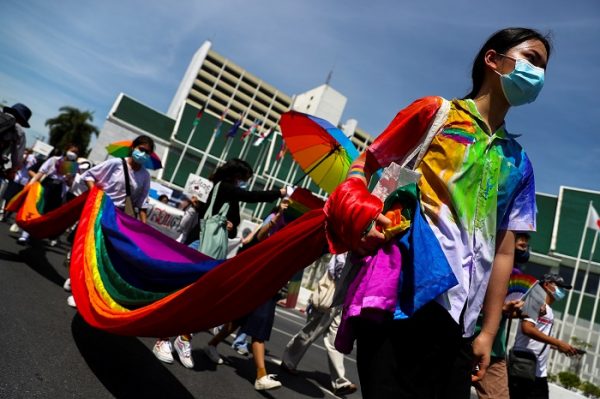If passed the law will become the first same-sex civil partnership law of its kind in the Southeast Asian region.
The cabinet-approved bill is still in draft form — it has yet to be vetted by the Thai Parliament before coming into law. Various Thai political parties may vie for rainbow votes by approving the bill with or without adjustments, or rejecting the bill and submitting another to allow same-sex marriage. The latter would involve reforming section 1448 of the Thai Civil Code which states that a marriage is between a man and a woman. A lobby argues that the current draft law still discriminates by failing to give same-sex couples the same legal standing as a man and a woman who wish to marry.
A lot of work has gone into preparing this draft civil partnership law. It has been through several stages of redrafting, with a series of governmental and civil society consultations over the past two years. At a public seminar, various religious representatives openly stated that they did not object to the civil partnership law but that they would object to a same-sex marriage law if proposed.
The cabinet-approved bill has been adjusted to respond to criticisms lodged against earlier drafts. The civil partnership builds on a consensual contract and comes close to recognising a family relationship between persons of the same sex. It is a legally binding agreement between two persons — at least one of whom must be a Thai citizen — that includes an obligation to take care of each other and inheritance rights.
While many other countries allow civil partnerships for any couple, the Thai bill focuses its scope to same-sex relations as the authorities claim it is these couples that are disadvantaged when compared with heterosexual couples.
Under the current laws, for example, same-sex couples are not allowed to sign hospital documents to take care of each other as family members. This would change under the new law because partners would be in a legal relationship. The law also has an umbrella clause which endeavours to incorporate provisions of the Thai Civil Code as much as possible to benefit same-sex partners.
There are now four parts to the draft law — registration of civil partnership, civil partnership, adoptions and inheritance. The third section was added specifically to quell the fear that same-sex couples would not be able to adopt children. The law now provides expressly for adoption by same-sex couples and even states that a partner can adopt the child of the other partner.
The cabinet has approved an accompanying law that provides for various amendments of the Thai Civil Code to account for the issue of civil partnership. Under the draft amendment, additional grounds for divorce is a circumstance where a husband or wife treats a third person as a wife, husband or partner. Adultery is also grounds for divorce.
The draft still has imperfections. It sets the age for civil partnership at 17 years old — the same as heterosexual marriage in Thailand — while internationally, the conventional marital age is 18 years. The law also does not cover tax deductions, government pensions and other spousal benefits.
The cabinet has also issued a decision pointing to the future. It calls on key ministries to consult each other on further reforms to benefit same-sex couples, such as on taxes and pensions. It is not ruling out the possibility of a same-sex marriage law.
The new civil partnership bill is a stepping stone in a series of gradual progressions. It is a long overdue but welcome constructive development toward equal rights that looks to humanity rather than gender.
Vitit Muntarbhorn is Professor Emeritus at Chulalongkorn University. He was the first UN Independent Expert on protection against violence and discrimination based on sexual orientation and gender identity.


“…while internationally, the conventional marital age is 18 years.”
Not quite correct. While 18 (without parental consent) is common, it is far from “conventional” and even in the UK it is 16 in Scotland and 18 in England, while internationally it varies between 23 and 15.